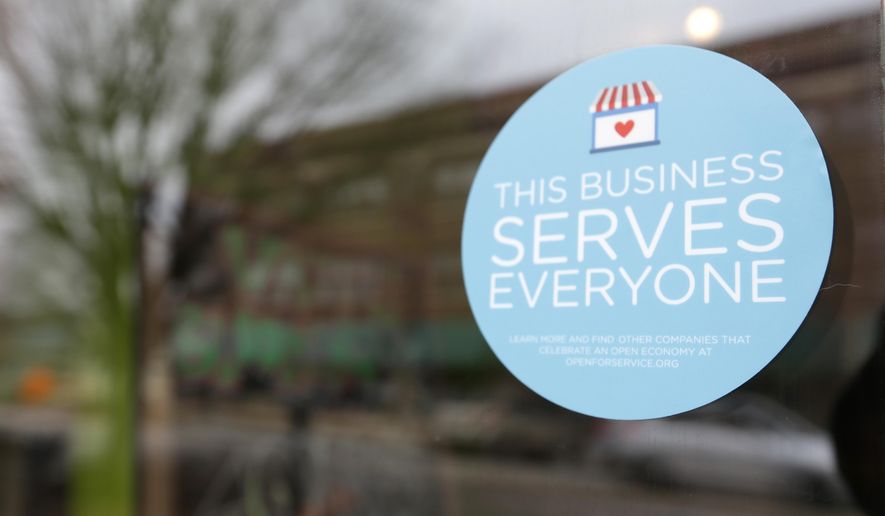It turns out some Muslim-owned bakeries are no more willing to create wedding cakes for same-sex ceremonies than their Christian counterparts.
Conservative podcast host Steven Crowder posted hidden-camera video Thursday showing employees at several Muslim-owned bakeries in Dearborn, Michigan, declining his business or referring him to other shops when he asked for a wedding cake with the message “Ben and Steven forever.”
Which was fine with Mr. Crowder. “I’m not even saying these Muslim bakeries shouldn’t have a right to do whatever they did — they absolutely should — and many more of them would than Christian bakeries,” he said in his podcast on the website Louder with Crowder.
His video makes a point that has long rankled the right: That Christian-owned shops have been targeted for legal action and derision for refusing to serve same-sex weddings even as gay-rights activists and media outlets ignore business owners of other faiths known for their conservative social views, notably Islam.
The fierce national debate over religious-freedom bills, particularly in Arkansas and Indiana, has increased the attention on Christian-owned businesses, which suddenly find themselves the subject of intense and potentially ruinous media focus.
“There is a witch-hunt now for Christian business owners,” said conservative radio talk-show host Dana Loesch on her Thursday program.
She pointed to Memories Pizza in Walkerton, Indiana, whose owners came under attack this week after telling an ABC57 reporter that they would not cater a hypothetical gay wedding — not that they had ever been asked to do so.
Supporters of the O’Connor family have since rallied, raising more than $750,000 as of Friday afternoon on a GoFundMe crowdfunding website set up by Ms. Loesch and her staff. The family, which was the subject of an arson threat and at one point considered moving, now plans to stay and reopen.
Meanwhile, CNN’s Gary Tuchman went to five florists in Jeff Davis County, Georgia, to ask whether they would provide floral arrangements for a same-sex wedding. Workers at all five shops said no, although he said those at only two of the businesses would agree to appear on camera.
The Anderson Cooper 360 segment, which named the employees but not their shops, came in response to a Religious Freedom Restoration Act bill under consideration in Georgia. The state legislature adjourned Thursday without acting on the bill.
In the two days since the report aired, the florists have come under heated criticism online. The Democratic Underground ran the headline, “CNN story about Georgia flower shops that want to go out of business,” while RawStory cited the florists’ “religious hypocrisy.”
The Michigan legislature is also weighing a RFRA, although Gov. Rick Snyder said Thursday that he would veto such a measure. While it may be tough to find a Muslim-owned bakery or florist in most U.S. cities, that’s not the case in Michigan, home to a large Muslim community in Dearborn.
Mr. Crowder’s video shows several employees at Muslim bakeries, which are not identified by name, referring him elsewhere. One baker shakes his head and says, “No, no, I don’t want it,” apparently referring to the cake-baking job.
Many of the Muslim bakeries were kind enough and willing to serve us, but many of them were not,” Mr. Crowder said.
The video drew a Facebook comment Friday from Ms. Loesch: “Waiting for the militant progressive supporters of gay wedding cake to start threatening and protesting these Muslim ran bakeries … I think we will be waiting a long time.”
The conservative website P.J. Media remarked in a Friday post, “Oddly enough, we haven’t seen any mainstream media reporters ambushing unsuspecting Muslim bakers and demanding in McCarthyesque fashion, “Are you now, or have you ever been a homosexual hater?”
Sommer Foster, director of political advocacy for the gay-rights group Equality Michigan, said she had not seen the video but was unaware of any discrimination complaints against Muslim-owned businesses.
“Any time we have a complaint from someone who thinks there’s discrimination, we will investigate no matter where the complaint comes from,” she said. “If we get a complaint, we will engage the business or we will engage the city leaders to see what we can do to rectify the situation. We don’t go looking for instances of discrimination.”
Rana Elmir, ACLU of Michigan deputy director, said in a statement that, “Businesses that are open to the public should be open to everyone on the same terms.”
“Freedom of religion is one of our most fundamental rights as Americans,” said the statement. “That’s why it’s protected in the state and federal constitution. But that freedom does not give any of us the right to harm others whether that’s a Christian business owner, a Muslim business owner, or Jewish business owner.”
Victor Begg, a founder and senior adviser to the Michigan Muslim Community Council, said U.S. Muslims are in general opposed to discrimination because they are often the targets of bias themselves. He added that opposition to gay marriage is rooted more in tradition than in religious doctrine.
“In Islam, it’s not sanctioned, that kind of marriage union,” Mr. Begg said, referring to same-sex marriage. “However, there is no real punishment prescribed.”
There are differences of opinion on same-sex marriage within the American Muslim community, just as there are within other religious groups, he said.
“You know, the Muslim community is no different than any other religious community. If you go to the Catholics, you’re going to find different opinions,” Mr. Begg said. “It’s a controversial topic.”
• Valerie Richardson can be reached at vrichardson@washingtontimes.com.




Please read our comment policy before commenting.